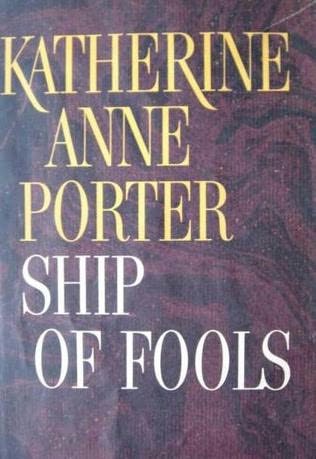 I realized with some chagrin the other day that I've posted nine books for class since the last one I finished as a personal choice, Tropic of Cancer. That's awfully depressing. To make matters worse, I had to suffer the ignominy of actually renewing the book I'd been reading, Katherine Porter's Ship of Fools, which had passed its one-month checkout limit. Clearly, school takes up far too much of my time, but at long last, here it is.
I realized with some chagrin the other day that I've posted nine books for class since the last one I finished as a personal choice, Tropic of Cancer. That's awfully depressing. To make matters worse, I had to suffer the ignominy of actually renewing the book I'd been reading, Katherine Porter's Ship of Fools, which had passed its one-month checkout limit. Clearly, school takes up far too much of my time, but at long last, here it is.I decided to read Ship of Fools after I read one of Katherine Porter's short stories, "Flowering Judas," in the textbook for my 20th Century American Literature class (instead of actually paying attention to the lecture). It was a really beautifully written story, full of bright imagery and concentrated more on relating certain moods and images than advancing a plot.
Ship of Fools isn't like that; it lacks the hazy-but-languid style of "Flowering Judas" and replaces it with something dryer, but it isn't without its flashes of beauty. Instead, it's a character-based novel that examines what happens when a large group of strangers--an ensemble cast somewhere in the twenties--comes together on a transatlantic voyage from Mexico to Germany in the period leading up to the Second World War. Some of these characters are more interesting than others, and these are the most interesting: Jenny Brown and David Scott, a pair of American artists and lovers whose relationship is falling apart, Wilhelm Freytag, a young German who is banished from the captain's table when it's revealed that his wife is Jewish and who cultivates a relationship with Jenny, Dr. Schumann, the ship's conservative doctor who falls in love with La Condesa, an upper-class Mexican political prisoner and drug addict on her way to exile in the Canary Islands, and a group of Spanish zarzuela dancers who are also thieves, pimps, and prostitutes. Apart from being a well-developed character study, Ship of Fools is also somewhat of a political allegory that traces the rise of Nazism in Germany in the way that not only Herr Lowenthal, the voyage's only Jew, is treated by the censorious Germans, but also the uber-Gentile Freytag and the "unrespectable" lower-class passengers quartered in steerage.
I wasn't sure of this book at first, but I grew to really like it; by focusing on the more interesting and affecting strands and relegating others to B-plots, it actually becomes a heartbreaking study in human cruelty and loneliness. The most moving part, I think, is when Ric and Rac, the two troublesome twins that travel with the zarzuela company, throw overboard Bebe, a bulldog that belongs to a professor and his wife. Bebe is saved by a steerage passenger, who dies in the process. Porter offers the man's name--Echegaray, a common Basque name--but nothing else about him, and so we are forced to examine him uncomfortably through the eyes of the well-to-do first-class passengers on the upper deck, who regard his funeral with disdain or amused detachment. He is buried at sea without any known family to contact, forgotten somewhere in the Atlantic.
Its flaw is that many of the ensemble characters are wholly single-faceted, like profane, racist Texan William Denny or the Jew-hating Herr Rieber, but the detail given to the other characters more than makes up for it, I think. All in all, I enjoyed this book, though I think the next one I choose for myself will have to be a bit shorter than Ship of Fools' 497 pages.

1 comment:
I read a couple of her short stories for class this semester, Noon Wine was a good one. It made me a little uneasy, which is good sometimes.
I know what you mean about not reading on your own. I haven't really read much since the end of August. I'm back at it though... there are about 5 half read books collecting dust on my shelf that I'm about to crack open again.
Post a Comment